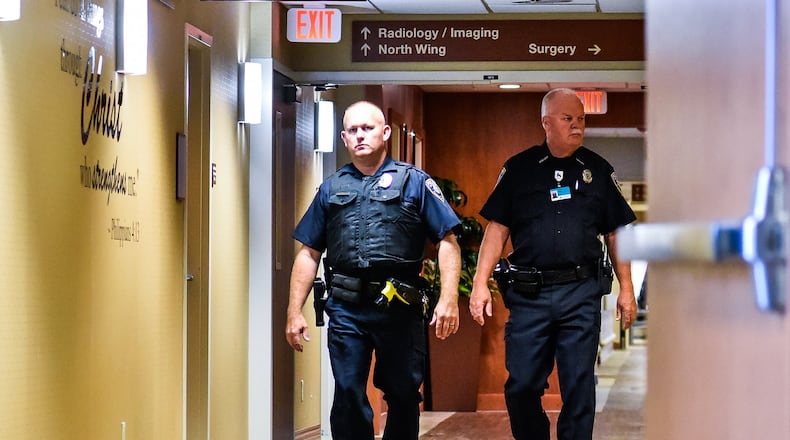Among the hospital police departments listed on the Ohio Attorney General’s website are Kettering Health Network, UC Health and Premier Health.
Atrium Medical Center in Middletown, which operates under Premier Health, has operated a police force since it opened in 2007, said John McKinney, director of facility management services and corporate safety officer.
There are 150 police and security officers throughout Kettering Health Network Police and Security Department. KHN is the health system under which Fort Hamilton operates.
All such officers complete a police academy training program in the State of Ohio and have been certified by the Ohio Peace Officer Training Commission, according to Maj. Eric Beeghly, who manages Kettering Health Network South Region Police & Security.
That designation allows them to quickly investigate criminal complaints and make arrests, he said.
MORE: Popular, award-winning restaurant opens Hamilton location
“Over the past two years throughout the Kettering Health Network we have been transitioning our security officer campuses to a blend of police and security officers,” said Beeghly, who started with KHN in January after nearly 20 years with Eaton Police Department.
“In order to do this we must have a collaborative agreement with the local jurisdiction.
Kettering Health Network officials met with Hamilton Police Department Chief Craig Bucheit, who gave KHN the authority to have police officers at the hospital, he said.
Fort Hamilton Hospital has always had security, but installing its own police force of 12 police officers and 6 security officers has given gives it an “extra layer of protection” for staff and patients, he said.
“It gives us a service … that, God forbid something were to happen and they were to be a victim of a crime, we are able to be here right away and help them through the process and investigate it immediately,” Beeghly said. “Having police officers on site also sends a message to offenders that illegal activity will not be tolerated at Fort Hamilton Hospital.”
MORE: Kings Island to announce ‘major new addition’ this week. Is this the new ride?
Hospital police officers can make arrests on theft cases or assaults, but would leave FBI index-level crimes such as homicide and rape to local law enforcement, Beeghly said.
The officers are commissioned through Ohio’s Secretary of State and not through the Ohio Attorney General like other law enforcement agencies, he said.
The staff is composed of retired police officers with many years of experience as detectives, certified Ohio Peace Officer Academy Instructors and other police specialist services. Staff also includes several police officers who work full time for other police agencies.
“By having officers with different levels of experience we can learn best policing practices and provide the best service possible for our patients, visitors and staff,” Beeghly said.
Officers were up to date in their own certification but still underwent in-house training on how they would police in the hospital, he said. They also will continue to have monthly online training and monthly departmental training.
“That’s a level of service that we’re really proud that we can provide for our community and our patients and staff here,” Beeghly said.
MORE: Hotel boom bringing more revenue to Butler County, with 6 more coming soon
Hospitals are committed to ensuring a safe environment for all who enter, Palmer said.
“Every institution is unique and takes a number of factors into account in determining how best to ensure their facilities are safe and secure,” he said. “We believe hospitals should have the flexibility to determine how best to ensure the security of their facilities—whether with security staff, police forces or other methods.”
MORE: 4 new offerings, including restaurant, coming to Cincinnati Premium Outlets
McKinney said it’s interesting to note that the hospital’s police are regulated not only by Ohio law, as law enforcement agencies are, but also through the Centers for Medicaid & Medicare Services and self-regulated through the The Joint Commission on Accreditation of Healthcare Organizations.
“So there’s even a higher level of items and expectations, rules and regulations that we must follow to comply with those kinds of organizations,” he said.
Police at Atrium and other Premier Health facilities routinely participate in emergency management drills that involve local law enforcement and first responders, McKinney said. They also routinely run through on-site exercises to prepare for what to do in certain situations, including possible infant abductions and violent patients, and conduct emergency management drills that involve local law enforcement and first responders.
“Because of the type of population that we’re serving, we want to make sure that everybody’s safe,” McKinney said.
About the Author

